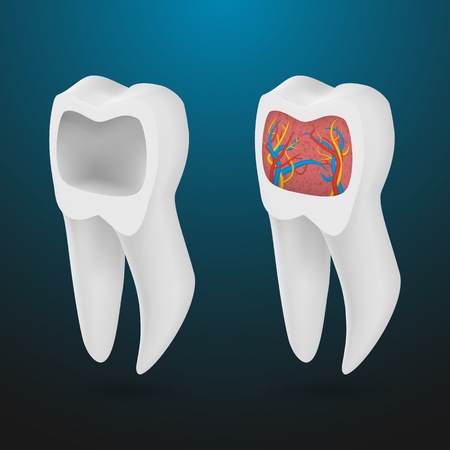Understanding the Basics: What Makes Teeth Strong
If you’re serious about keeping your dental bills down, it pays to really understand what makes teeth healthy and resilient in the first place. Your teeth aren’t just hard shells—they’re actually complex structures made up of several layers, each with a specific job. The outermost layer, enamel, is the hardest substance in your body and acts as the main line of defense against cavities and wear. Beneath that is dentin, which provides support and absorbs pressure from chewing. Both of these layers rely heavily on minerals like calcium and phosphate to stay strong and resist decay.
But here’s something many people overlook: these minerals can be lost over time due to acidic foods, sugary drinks, or just everyday wear and tear. When this happens, your teeth become more vulnerable to problems—and those dental bills start adding up fast. By understanding how enamel and dentin work together, and the critical role minerals play in maintaining them, you’ll be better equipped to make smart choices that naturally strengthen your teeth and help you avoid costly trips to the dentist. In the next sections, we’ll dive into practical strategies rooted in science and real-life experience—because honestly, nobody wants to spend more time (or money) at the dentist than they have to.
2. The Power of Food: Best Diet Choices for Stronger Teeth
If you want to cut down your dental bills and keep your teeth naturally strong, what you eat every day actually matters a lot. The good news? Many foods that are staples in the American diet can help support healthier teeth and gums—without breaking the bank or feeling like you’re “going on a diet.” It’s all about making smart swaps and knowing which foods have real benefits.
Everyday Foods That Support Dental Health
Here’s a quick breakdown of practical, affordable foods you’ll find at any local grocery store that can make a difference:
| Food | Why It Helps | Easy Ways to Add It |
|---|---|---|
| Dairy (milk, cheese, yogurt) | Packed with calcium & phosphates; helps rebuild tooth enamel and neutralize acids | Add cheese to sandwiches, swap soda for milk, snack on Greek yogurt |
| Leafy Greens (spinach, kale) | High in vitamins & minerals that strengthen teeth; low in sugar | Toss into salads, smoothies, or omelets |
| Crispy Fruits & Veggies (apples, carrots, celery) | Act as natural toothbrushes; stimulate saliva production to wash away food particles | Snack raw, add to lunchboxes or salads |
| Nuts (almonds, walnuts) | Good source of protein & minerals; low in sugar; help scrub teeth as you chew | A handful as a snack or sprinkled over oatmeal |
| Lean Proteins (chicken, turkey, eggs) | Rich in phosphorus—another tooth-strengthening mineral | Add to wraps, salads, or breakfast plates |
| Water (fluoridated tap water) | Keeps your mouth clean and helps prevent dry mouth; fluoride protects enamel | Sip throughout the day instead of sugary drinks |
Avoiding Common Pitfalls: What to Limit or Skip
If you love soda or sweet snacks, it’s not about total deprivation—it’s about moderation. Sugary drinks and sticky candies feed bacteria that erode enamel and drive up those dental bills. Try swapping out one soda a day for water or unsweetened tea. If you need something sweet after dinner, go for fruit instead of candy.
The Bottom Line: Small Changes Add Up
You don’t have to overhaul your entire menu. Just being mindful of these everyday foods—and making a few simple swaps—can keep your teeth stronger naturally and help reduce those costly visits to the dentist. Plus, most of these foods fit right into a typical American lifestyle without extra hassle or expense.
![]()
3. Daily Habits That Actually Help Your Teeth
If you’re serious about saving money at the dentist, it’s all about building smart daily habits. You don’t have to be perfect, but a few simple tweaks can make a real difference—trust me, your wallet will thank you later! First up: never underestimate the power of brushing twice a day with a soft-bristled toothbrush and fluoride toothpaste. Don’t rush it; spend those two minutes getting every surface. I know life gets busy, but skipping even one session adds up over time. Next, flossing isn’t just for show—it reaches spots your toothbrush misses and helps prevent gum disease and cavities. If traditional floss feels awkward, try floss picks or water flossers; they’re honestly game changers for making flossing less of a chore.
Hydration Matters More Than You Think
Here’s something most people overlook: staying hydrated. Drinking plenty of water—especially after meals—helps wash away food particles and balances acids in your mouth that can erode enamel. Plus, if you swap out sugary drinks for water, you’ll seriously reduce your risk of cavities (and save money on both dental work and your grocery bill). Even chewing sugar-free gum can boost saliva production and help clean your teeth between meals.
Snack Smarter for Stronger Teeth
Your snacking habits play a role too. Crunchy fruits and veggies like apples, carrots, and celery naturally scrub your teeth as you chew, while also providing vitamins that strengthen enamel. Avoid constant grazing on starchy or sugary snacks—those fuel bacteria that cause tooth decay. Instead, reach for whole foods that keep both your body and smile healthy.
Consistency Is Key
Look, none of these habits are rocket science—but consistency is everything. The more often you practice these routines, the fewer surprises you’ll get at your next checkup. And in the long run, these easy lifestyle tweaks could mean fewer fillings, less pain, and way lower dental bills. As someone who’s learned from experience (and a couple of hefty dental invoices), trust me: small changes really do add up.
4. Hidden Tooth Enemies in American Life
If you’re trying to keep your dental bills low and your smile strong, it’s important to recognize the everyday threats lurking in typical American routines. We’re talking about more than just candy bars—think sugary snacks, energy drinks, and even those stressful work habits that keep you clenching your jaw without realizing it. These silent culprits can do real damage over time, but there are practical ways to fight back.
Common Threats That Weaken Teeth
| Threat | How It Harms Your Teeth | Why Its Common in America |
|---|---|---|
| Sugary Snacks & Drinks | Feed cavity-causing bacteria, leading to enamel erosion and decay | Available everywhere—offices, schools, gas stations, even at home |
| Energy Drinks & Soda | High acid content erodes enamel quickly; sugar compounds the risk | Popular pick-me-up for long workdays and busy lifestyles |
| Stress-Related Habits (Grinding/Clenching) | Can cause cracks, chips, and wear down enamel; sometimes leads to jaw pain | High-pressure jobs and constant hustle culture make this a silent epidemic |
| Constant Snacking | Keeps mouth acidic for longer periods, giving bacteria more time to work | On-the-go eating and food delivery apps fuel this habit |
Smart Strategies to Protect Your Teeth (and Your Wallet)
- Swap Out Sugary Snacks: Choose nuts, cheese, or crunchy veggies like carrots instead of cookies or candy bars.
- Dilute or Limit Acidic Beverages: Drink water after sodas or energy drinks and try cutting back gradually.
- Address Stress: Practice relaxation techniques like deep breathing or short walks to prevent unconscious grinding.
- Create Snack-Free Zones: Designate mealtimes and avoid grazing throughout the day to give your mouth time to recover.
- Stay Hydrated: Water helps wash away acids and sugars that stick around after eating or drinking.
The Consumer Perspective: Why This Matters for Dental Costs
If you stay mindful of these hidden threats and take simple steps to reduce their impact, you’ll not only keep your teeth stronger naturally—you’ll also be dodging extra dentist visits (and those nasty surprise bills). In a country where dental insurance doesn’t always cover everything, prevention really is the best way to protect both your health and your wallet.
5. Natural Remineralization: Strengthen Without the Chemicals
If you’re looking to keep your teeth strong without relying on harsh chemicals, natural remineralization methods are a smart, budget-friendly choice. Plenty of science-backed options exist in the U.S. to help rebuild tooth enamel and protect against cavities—no fancy or expensive products required.
Try Remineralizing Toothpaste with Natural Ingredients
Look for fluoride-free toothpaste featuring hydroxyapatite—a natural mineral that’s similar to what makes up your teeth. Studies show hydroxyapatite can help repair early enamel damage and is safe for daily use. Brands like Boka and RiseWell offer these formulas at most U.S. retailers or online.
Eat Enamel-Friendly Foods
Your diet matters more than you think. Foods high in calcium (like cheese, yogurt, and almonds) and phosphorus (such as eggs, fish, and tofu) provide key minerals needed for rebuilding enamel. Vitamin D-rich foods (think salmon and fortified plant milk) also support this process by helping your body absorb calcium more efficiently.
Cut Down on Sugary and Acidic Foods
The less sugar and acid your teeth are exposed to, the better chance your enamel has to remineralize naturally. Swap soda for water or herbal tea, and choose fresh fruit over sticky candies. If you do indulge in something sweet or acidic, rinse your mouth with water afterward rather than brushing immediately—brushing right away can actually spread the acid around and make things worse.
Try Oil Pulling as a Gentle Option
This ancient practice is making a comeback in the U.S., especially among people seeking natural oral care. Swishing coconut oil in your mouth for about 10-15 minutes may reduce harmful bacteria and support a healthier environment for remineralization. While oil pulling isn’t a substitute for brushing or flossing, it’s a safe add-on if you’re curious about holistic dental health.
Stay Consistent for Lasting Results
No one-and-done solution exists—natural remineralization works best when you build these habits into your daily routine. Combined with regular dental visits, these approaches can help you avoid unnecessary treatments and keep both your smile and wallet healthy.
6. When to See a Pro: Smart Spending on Dental Care
If you’re serious about strengthening your teeth naturally and keeping dental costs down, knowing when to visit a dentist—and how to spend smartly—is just as important as your daily oral care routine. Here’s some real talk from a consumer perspective, so you can save money without risking your smile.
Catch Problems Early with Regular Check-Ups
Let’s be honest: Skipping dental check-ups to save a few bucks can backfire big time. Most insurance plans in the U.S. cover basic exams and cleanings twice a year—take advantage of this! These visits help catch issues like cavities or gum disease before they turn into expensive emergencies. If you notice any pain, sensitivity, bleeding gums, or changes in your mouth, don’t wait it out. Early intervention is always cheaper (and less painful) than major fixes.
Treatments You Might Want to Skip
Not every procedure pitched by your dentist is essential. Think twice before splurging on cosmetic treatments like teeth whitening or veneers if you’re trying to cut costs. Also, ask for clear explanations before agreeing to fillings for “watch” cavities, deep cleanings without clear signs of gum disease, or pricey fluoride treatments if you already have a solid at-home routine. It’s okay to get a second opinion or ask for evidence-based recommendations—your wallet will thank you.
Navigating Dental Insurance Like a Pro
Dental insurance in the U.S. can be confusing, but understanding your plan helps avoid surprise bills. Always check what’s covered and what your copays or deductibles are before booking procedures. If your employer offers an FSA (Flexible Spending Account) or HSA (Health Savings Account), use pre-tax dollars for dental expenses—it’s free money! Don’t hesitate to compare prices between local dentists and look for clinics that offer payment plans or discounts for cash payments.
Bottom line: Strengthening your teeth naturally is awesome, but don’t go it alone when professional help is needed. With early detection, informed choices on treatments, and savvy use of insurance, you can keep your teeth healthy while avoiding unnecessary spending—a win-win for both your health and your budget.


